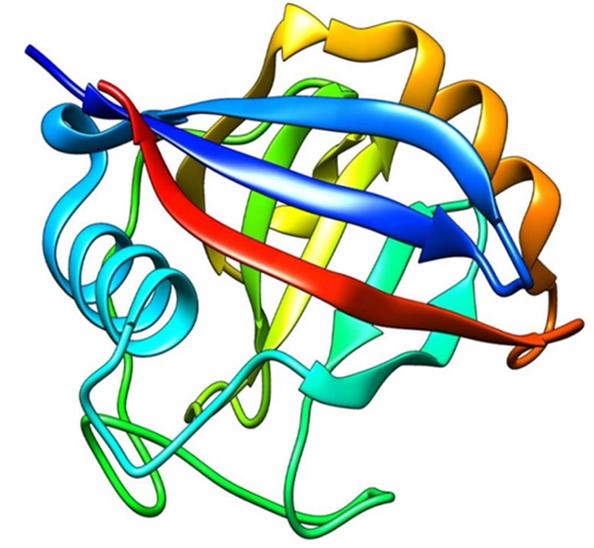What is PPIA Protein
The PPIA protein, officially known as Peptidyl-prolyl cis-trans isomerase A, is a key player in the intricate world of molecular biology. Also referred to as Cyclophilin A or CypA, it belongs to the cyclophilin family and is widely recognized for its essential role in catalyzing the cis-trans isomerization of proline imidic peptide bonds. This dynamic protein is encoded by the PPIA gene and is ubiquitously expressed in various tissues and cellular compartments.
Structurally, PPIA is characterized by a conserved cyclophilin-like domain, featuring an eight-stranded antiparallel beta-sheet surrounded by alpha-helices. This unique structural composition allows PPIA to seamlessly facilitate the interconversion of proline isomers, contributing to the proper folding of proteins during their synthesis.
Recent research advances in the field have shed light on the multifaceted nature of PPIA. Its involvement in various cellular processes, beyond its classical chaperone function, has sparked interest in unraveling the intricate web of molecular interactions governed by this protein.

Figure 1. The beta-barrel structure OF Human Cyclophilin A. (Idris M, et al., 2019)
PPIA Biological Functions and Molecular Mechanisms
PPIA's biological functions extend far beyond its role as a mere isomerase. This versatile protein actively participates in protein folding, trafficking, and assembly. By catalyzing the cis-trans isomerization of proline residues, PPIA facilitates the proper folding of nascent polypeptide chains, ensuring their structural integrity.
Moreover, PPIA's involvement in immune response modulation has come to the forefront. It interacts with several components of the immune system, influencing the activation and function of T lymphocytes. PPIA has been implicated in the regulation of inflammatory responses, making it a potential target for therapeutic interventions in immune-related disorders.
PPIA Related Signaling Pathway
PPIA exerts its influence on cellular processes through various signal pathways. Notably, it is involved in the calcineurin-NFAT pathway, a crucial signaling cascade in T lymphocytes. PPIA's interaction with calcineurin modulates T cell activation, highlighting its importance in immune responses.
In addition to immune-related pathways, PPIA has been implicated in cellular stress responses and apoptosis. Its participation in these pathways further underscores the intricate network of molecular events orchestrated by this protein.
PPIA Related Diseases
The dysregulation of PPIA has been linked to various diseases, underscoring its significance in maintaining cellular homeostasis. In cancer, altered PPIA expression has been associated with tumor progression and resistance to chemotherapy. Neurological disorders, such as Alzheimer's disease, have also shown connections to abnormal PPIA levels, implicating its role in neurodegenerative processes.
The immunomodulatory functions of PPIA make it a noteworthy player in autoimmune diseases. Its involvement in regulating T cell activation suggests a potential role in conditions like rheumatoid arthritis and systemic lupus erythematosus.
PPIA's Applications in Biomedicine
The unique properties of PPIA have positioned it as a valuable tool in biomedical research and applications. Its potential in diagnostic development is exemplified by its association with various diseases. Monitoring PPIA levels could serve as a biomarker for certain cancers and immune-related disorders, aiding in early detection and prognosis.
In vaccine development, PPIA's immunomodulatory functions make it a candidate for enhancing immune responses. Research is underway to explore its inclusion as an adjuvant, potentially amplifying the efficacy of vaccines against infectious diseases.
Therapeutically, targeting PPIA has garnered attention in various disease contexts. Small molecules that modulate PPIA activity are being investigated as potential drugs for cancer and autoimmune disorders. The ability of PPIA to influence immune responses opens avenues for developing novel immunotherapies.
Recommended Products
| Cat.# | Product name | Species | Source (Host) | Tag |
|---|---|---|---|---|
| PPIA-001H | Recombinant Human PPIA Protein, MYC/DDK-tagged, C13 and N15-labeled | Human | HEK293 | C-Myc/DDK |
| PPIA-26334TH | Active Recombinant Human PPIA | Human | E.coli | N/A |
| PPIA-1743H | Recombinant Human PPIA Protein, His (Fc)-Avi-tagged | Human | HEK293 | His (Fc)-Avi |
| PPIA-4080H | Recombinant Human PPIA protein, His&Myc-tagged | Human | E.coli | His&Myc |
| PPIA-60H | Recombinant Human PPIA, His-tagged | Human | E.coli | His |
| PPIA-187H | Recombinant Human PPIA | Human | Mammalian Cell | His |
| PPIA-4082H | Recombinant Human PPIA protein | Human | E.coli | N/A |
| PPIA-8311H | Active Recombinant Human PPIA, His tagged | Human | E.coli | His |
| PPIA-1140H | Recombinant Human PPIA, His tagged | Human | E.coli | His |
Reference
- Idris M, et al. Cyclophilins: The structure and functions of an important peptidyl-prolyl isomerase. Int. J. Biochem. Biophys. Mol. Biol, 2019, 4: 1-6.

